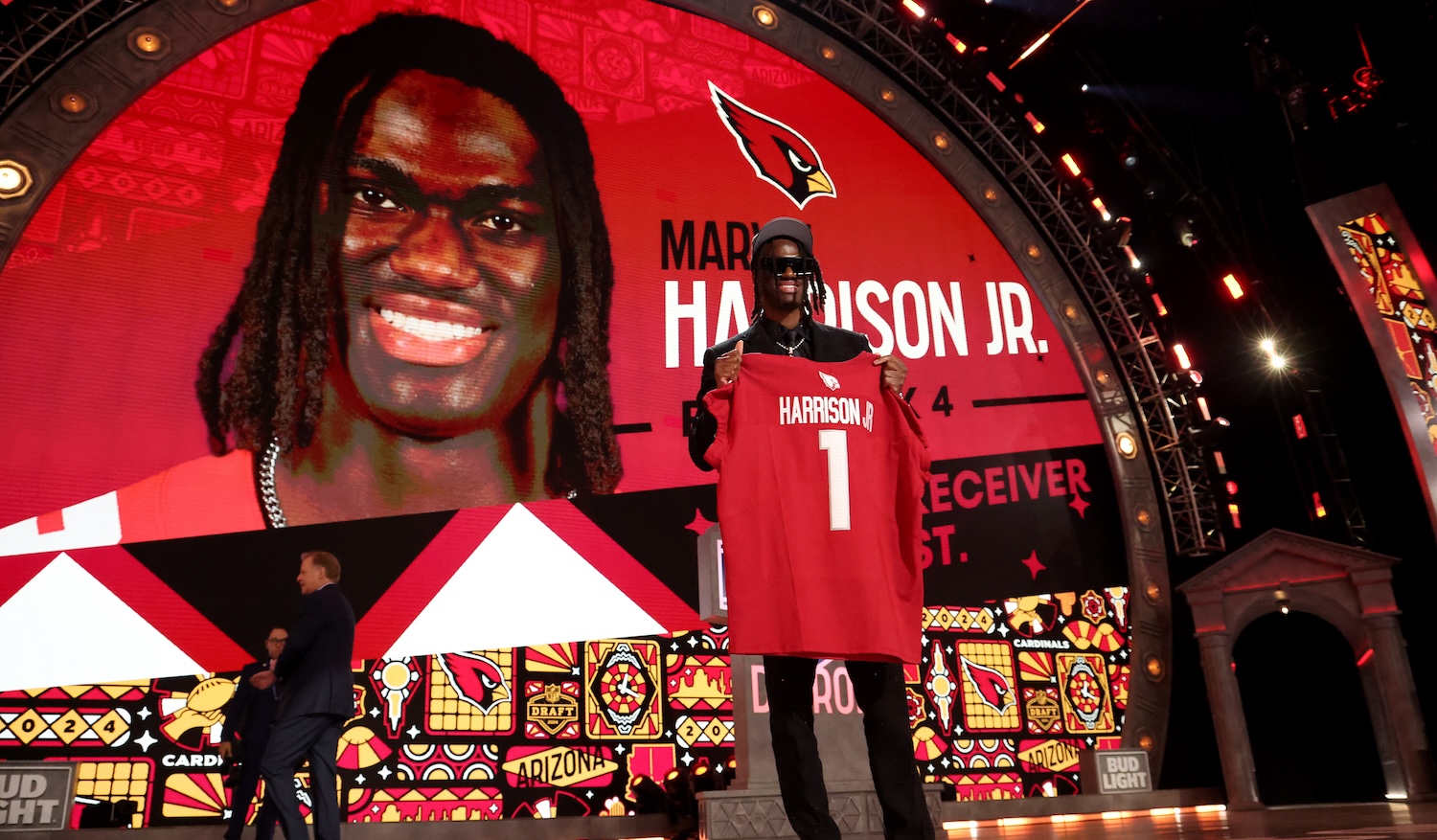Fanatics filed a lawsuit against Arizona Cardinals rookie receiver Marvin Harrison Jr. this past Saturday in New York Supreme Court, alleging that he breached a contract he signed with the company one year ago. Fanatics, one of the most widely loathed companies in the sports world, wrote in the complaint that "no athlete—other than Harrison Jr.—has ever repudiated their deal with Fanatics," and that "despite years of contracting with hundreds of top athletes, Fanatics has never had to resort to the courts to enforce its rights against an athlete." The suit represents a new escalation in what has been a protracted, strange game of chicken between Harrison Jr. and Fanatics over his name, image, and likeness rights.
Shortly after the Cardinals drafted Harrison Jr. with the fourth overall pick in last month's NFL draft, news broke that the former Ohio State wide receiver had not signed the NFL Players Association's group licensing agreement. The GLA allows the NFLPA to sell players' NIL to over 80 companies that work alongside the NFL and its players. Signing the GLA is standard procedure for incoming rookies, and Harrison Jr. refusing to sign meant that Nike could not make Harrison Jr. jerseys to sell to fans, and that the Madden video game series couldn't include him. He snubbed the GLA because he reportedly signed a marketing deal with Fanatics in May 2023 that gave the company the rights to his autograph, game-worn jerseys, and other memorabilia. Harrison Jr. does not have an agent, and is instead represented by his father, former Colts wide receiver Marvin Harrison Sr.
The trouble started, Fanatics says, shortly before the NFL Draft, when Harrison Sr. asked for a copy of an apparently binding term sheet. Once he got his hands on it, Harrison Sr. allegedly told the company that "we do not have a deal with Fanatics." It seems the nature of the word "binding" is in question. A term sheet is different than a contract; indeed, the factor that distinguishes one from the other is that a term sheet is not legally binding, whereas a contract is. Frustratingly, the details of the agreement that Fanatics has in its complaint are heavily redacted.
Either way, sources told ESPN that the Harrisons are using Marvin Jr.'s refusal to sign the GLA and public insistence that he doesn't have a deal with Fanatics as leverage to get a more lucrative deal out of Fanatics. The company also said as much in the suit, adding that the Harrisons came to the company and told them they had more lucrative offers they wanted Fanatics to match. Fanatics claims to have asked to see copies of these offers, but that the Harrisons never presented them.
Hilariously, another tactic the Harrisons allegedly used to try and squeeze Fanatics was leaking information to the most sunburnt man in sports media, Pat McAfee. The WNBA expert reported on his show, citing a "source inside the Marvin Harrison Jr. camp," that the two parties never had a deal and that Harrison Jr. would sign the GLA when the time came.
![On May 1, 2024, sports analyst Pat McAfee reported during his live show on ESPNthat he had talked to Harrison Jr.’s camp, which informed him that Harrison Jr.’s announced refusalto enter into the NFLPA Licensing Program “was not about the NFLPA” and that he “will be apart of the NFLPA when the time comes.”1Instead, McAfee reported that—according to HarrisonJr.’s camp—he never agreed to a trading card deal with Fanatics and had told Fanatics when itapproached him, “we’re not taking that deal, we’re not signing that deal.” Despite the inaccuracies,Harrison Jr. confirmed McAfee’s account by reposting McAfee’s tweet, which containedMcAfee’s video and McAfee’s statement that “[w]e have heard from source(s) inside the MarvinHarrison Jr. Camp… This isn’t about the NFLPA2 & he’ll be part of it when the time comes…This all revolves around a potential beef with Fanatics from an offer that was made when he wasa sophomore in College[.]”3](https://lede-admin.defector.com/wp-content/uploads/sites/28/2024/05/Screenshot-2024-05-21-at-7.20.14 AM.jpg?w=710)
I suppose there's a lesson here, though not a broadly applicable one: Do not bring a Pat McAfee to a Michael Rubin fight.






